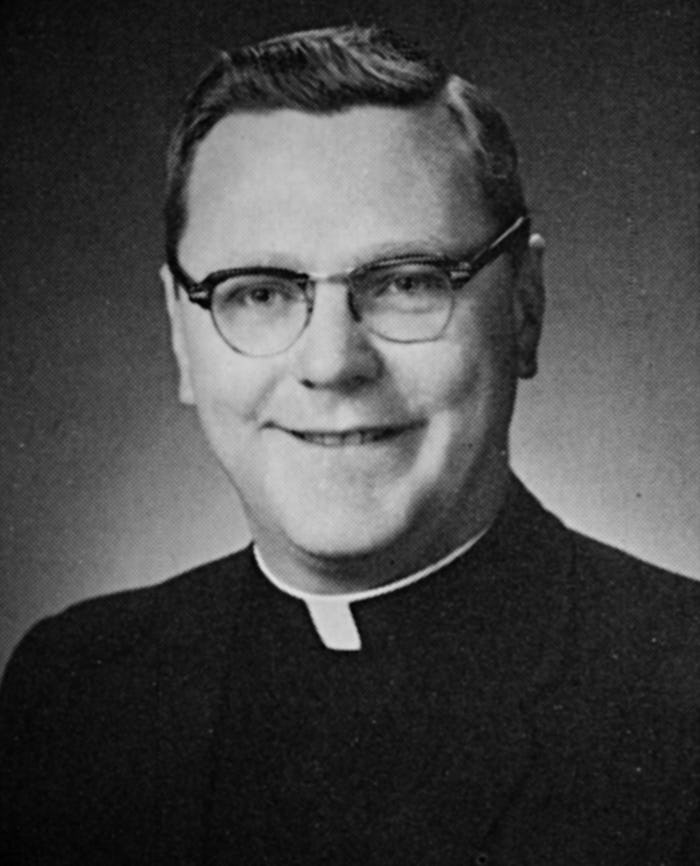Entertainment

Father Maskell's Life Comes To Light On 'The Keepers'
Netflix's latest true crime story is The Keepers, which is already garnering comparisons to the 2015 docu-series Making a Murderer. The true crime documentary follows a cold case from nearly half a century ago, when Sister Cathy Cesnik vanished in November 1969 and was found choked and beaten to death nearly two months later. The show tracks the newly-revisited investigation into her murder, her life, and those surrounding her at the time of her death. One of the bigger characters in her life was Father Maskell, who worked at the same school she worked at the time of her death. It also poses an important question that many viewers may be wondering while starting the series: Did Father Maskell kill Sister Cathy?
Ultimately, the case is still unsolved, and no one was ever charged with the crime. The evidence in favor of this theory is compelling, though nothing has been confirmed. In fact, when Romper reached out to the Baltimore Archdiocese for a comment on the matter, spokesperson Sean Caine stated: "Father Maskell was never considered a suspect in that murder. He was interviewed once. One of the victims claimed that she had a recovered memory of his involvement in her death, but he was interviewed and never charged."
Father Joseph Maskell was the chaplain of Archbishop Keough High School in Baltimore, Maryland at the time of Cesnik's death. Cesnik had worked there as a teacher for a time, before leaving to work at a different high school shortly before her death. Years later, Maskell was publicly accused of sexual abuse by several Keough students — many of whom, like Jean Hargadon Wehner, were counseled by the priest, a trusted and powerful member of the heavily Catholic community in the city. (Maskell denied initial accusations until his death in 2001.)
At the time, he also served as the chaplain for the Baltimore County Police Department, the Maryland State Police, and the Maryland National Guard, often boasting about going on "ride-alongs" with "police friends," according to what auto repair shop owner Bob Fisher told HuffPost. The main takeaway is that Maskell (whose older brother was a cop) was undeniably well-connected within the higher-ups of Baltimore.
At the time of Cesnik's death and the recovery of her body, Maskell wasn't actively investigated in connection with the crime. Instead, the first person of interest was Gerard Koob, a Jesuit priest and former boyfriend of Cesnik's. Nick Giangrasso, a then 28-year-old homicide detective, was assigned to investigate her initial disappearance (before the nun's body was found outside of his department's jurisdiction) and recalled feeling strangely about the ties between the police department and the Catholic Church: "The Catholic Church had a lot of input into the police department," Giangrasso stated during the same HuffPost article. "A lot of power."
Romper reached out for comment to the Baltimore County Police Department regarding any suggestions of a suspected cover-up, to which they stated:
In the nearly 50 years since Sister Cathy Cesnik’s murder, no one has come to us to initiate an investigation of wrongdoing by police officers. If anyone has information about improper actions by police in connection with this case, we strongly encourage them to come forward now so detectives can conduct a formal, proper investigation.
For over 20 years, the case remained dormant and Maskell was not accused of any crime. In 1992, Wehner came forward (then anonymously) with her story when she'd recovered memories of the abuse. She and another victim alleging abuse by Maskell, Teresa Lancaster, filed suit against the priest, the school, and the church in 1994 as "Jane Doe" and "Jane Roe." They didn't win their case, but Wehner's testimony recounting Maskell allegedly taking her to see Cesnik's body — weeks before it was recovered by authorities — was enough for the police to re-open the case that June. Wehner told HuffPost in 2015 that the priest had whispered in her ear: "You see what happens when you say bad things about people?"
The police even dug up old records that Maskell had ordered buried, and it almost seemed like the investigation might get somewhere. But Maskell fled to Ireland before he'd had a chance to be questioned and the police department once again dropped their case — by April 1995, a Baltimore Sun report said that the case had been "reshelved." Maskell died in 2001, never charged with any crime, though Sean Caine (the Archdiocese of Baltimore spokesman) told HuffPost in 2015 that the priest had been "credibly accused of sexual abuse of minors." In recent years, the church even paid out-of-court settlements to Maskell's victims.
It may never be known with certainty who killed the young nun. But The Keepers is already having a real-world impact — just last week, the Baltimore County Police department revealed that they'd exhumed Maskell's body, intending to compare his DNA with the relatively little physical evidence left in the Cesnik case. However, on May 17, the results showed that Father Maskell's DNA did not match crime scene evidence, according to The Washington Post. So, for now, the identity of Cesnik's killer continues to remain a mystery.